Thirsty Classics is a nine-week miniseries celebrating lesbian cinema from before 1980. We often talk about these films like homework or mere stepping stones, but Drew is here to share how they can be fun… if you’re horny enough. This week: William Wyler’s The Children’s Hour (1961) starring Shirley MacLaine and Audrey Hepburn.
Turn of the (latest) century classic If These Walls Could Talk 2 starts in a movie theatre. The year is 1961. “You’re afraid of hearing it, but I’m more afraid than you,” Shirley MacLaine cries desperately at Audrey Hepburn. The camera pulls back to reveal straight people leaving the theatre in disgust. We cut to an older lesbian couple watching intently. They’re holding hands. One of them cries.
This trio of shorts will end with Ellen Degeneres and Sharon Stone conceiving a child. But it begins with The Children’s Hour to show how far we’ve come. “Oh, too much high drama for my taste. I like comedy better,” one of the women says upon leaving the theatre.
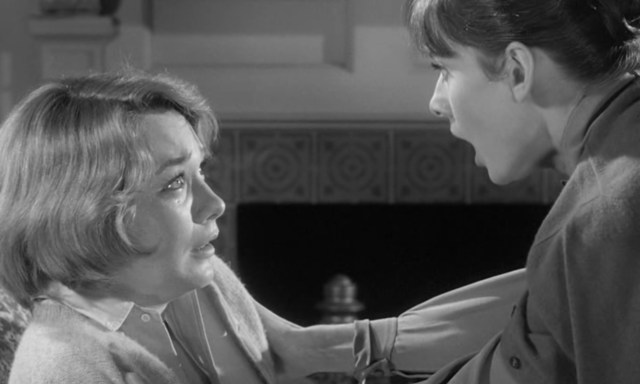
“And that’s how lesbians have sex!”
William Wyler’s adaptation of Lillian Hellman’s 1934 play is not known as a fun movie. In fact, (spoiler alert) it famously ends in suicide. Audrey Hepburn and Shirley MacLaine play best friends, gal pals if you will, who run a school for girls. They are named Karen and Martha, but I’m just going to refer to them as Audrey and Shirley because I think a level of remove is the best way to approach this 60-year-old film.
Audrey and Shirley went to college together and opened up this school, but now a straight cis man (ugh) threatens to ruin their bond. Doctor Joe wants to marry Audrey Hepburn (sure!) and she agrees because it would be nice to have a house filled with books. You know, like a straight woman! Shirley is an absolute wreck over this and doesn’t know why. Her excuse that they need to focus on the school is less than convincing and her washed-up Broadway star aunt has started to notice. “It’s unnatural. It’s just as unnatural as it can be,” she scolds.
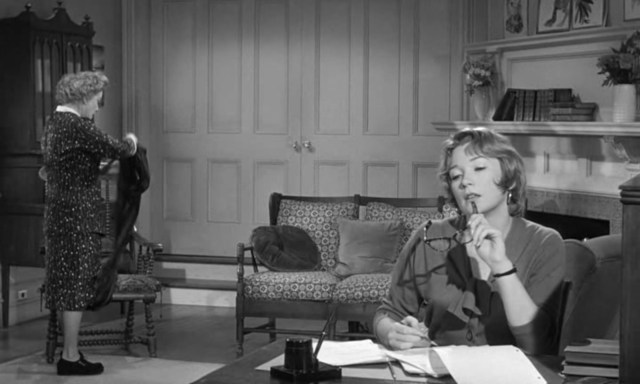
She can grade my paper any day.
Some of the students overhear this argument and the most insidious of the bunch, Mary Tilford, decides to use it as revenge. She’s mad about some light punishment she received for lying, tardiness, and generally being a terror. When her cries of unfairness are ignored, this cross between Damien from The Omen and every girl to ever appear on My Super Sweet 16 devises a plan. She accuses her teachers of lesbianism, and blackmails a fellow student into corroborating. Her grandmother believes her and one by one the children are removed from the once-burgeoning school. It’s a lie. But as Shirley MacLaine will cry out later in the film, “She found the lie with an ounce of truth.”
Lost amidst this plot, amidst the lies, the ruined lives, the self-hatred and shame and suicide, is a detail I really must underline: Audrey Hepburn and Shirley MacLaine play queer women in love. These two adorable lesbians crackle with sexual tension and even in the most dramatic moments connect in a way that’s heartwarming and sexy.
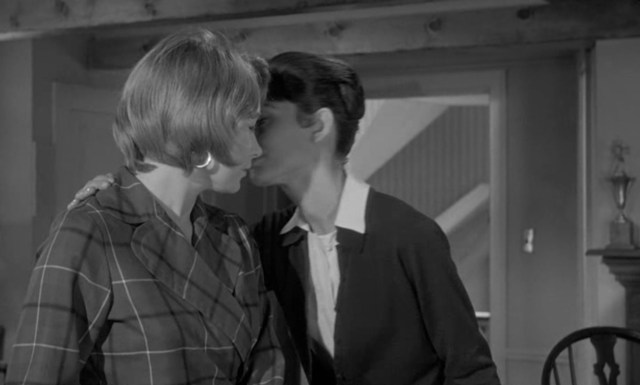
Make out! Make out! Make out!
Early in the film while celebrating the school’s success, Shirley mentions they can now afford to get Audrey some new clothes. “What about you?” Audrey asks. “Oh, I’m a skirt and blouse character. We’re always in style. You’re Fifth Avenue. Rue de la Paix.” The futch/femme dynamic is strong with these two. Shirley daydreams about their first meeting. “I remember thinking, What a pretty girl.” Later, Audrey kisses her cheek and Mary’s eyes widen. Mine do too.
Audrey Hepburn is obviously beautiful. Dorm rooms everywhere are plastered with her face, a femme ideal to aspire to. But I have been, and always will be, in love with Shirley MacLaine, and it is so much fun to watch her lust after a woman. It’s unsurprising that MacLaine was often cast as a sort of prototypical manic pixie dream girl. She’s so good at covering up a deep sadness with a cute smile… and then betraying that emotion with a glimpse in her eyes. But while she’s the object of desire in films like The Apartment, here she gets to be the one who desires. And oh, how she desires. She’s consumed. She desperately wants to hang up her cardigan, rip off Audrey’s pencil skirt, and open an all-girls school, if you know what I mean.
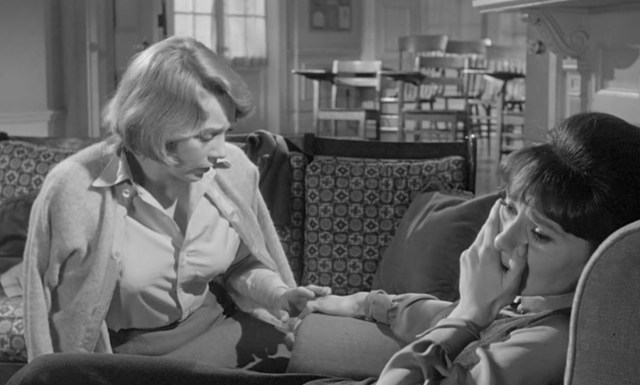
“I think we should start with these two and see how it goes.”
I’m not sure if Shirley’s hair is a bob with layers or a pageboy or if a pageboy is just a bob with layers, but it’s so cute and whenever the movie dips into high drama it gets more and more frazzled. It has weird, perfect curves with a swoop of bangs covering the left side of her forehead like Phoebe Waller-Bridge’s gay foremother. And while the movie is in black & white, it’s still so obviously, beautifully, strikingly red.
The Children’s Hour is an odd movie because the villains are correct. They may lack tact, they may be malicious, but they are correct. Straight audiences in the 60s took away a message about the dangers of gossip. But the real tragedy is not the accusations of homosexuality, but, rather, that accusations of homosexuality are inherently seen as negative. Mary Tilford is so aggressive in her brattiness, she almost feels like a high camp villain determined simply to yank these two tentative lovebirds out of the closet. And it almost works. Audrey ditches the doctor and suggests they get out of town. “This isn’t a new sin they say we’ve done. Other people haven’t been destroyed by it.” But Lillian Hellman and William Wyler won’t, or, more accurately, weren’t allowed, to have Audrey and Shirley canoodle their way to San Francisco. The excuse they find is Shirley’s self-hatred.
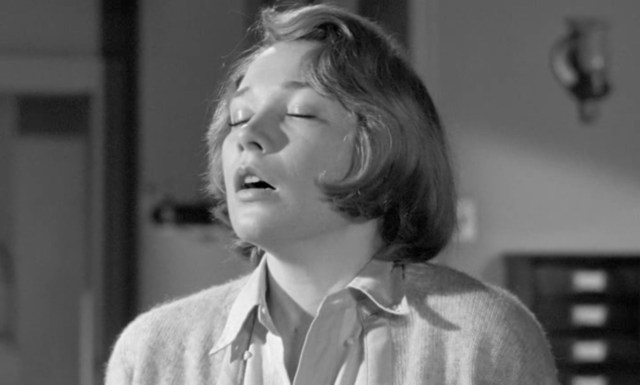
O-Face. As in, O I’m so ashamed to be gay.
The most famous scene of the movie, the scene that opens If These Walls Could Talk 2, is Shirley’s confession. “Listen to me! I have loved you the way they said! There’s always been something wrong. Always, just as long as a I can remember. But I never knew what it was until all this happened.” She continues with even greater emotion, “I don’t know how, I don’t know why. But I did love you. I do love you! I resented your plans to marry maybe because I wanted you. Maybe I’ve wanted you all these years.” No maybe. Definitely.
This scene is heartbreaking, truly. I want to make sure to say that. But. There is a certain pleasure in watching Shirley get increasingly breathy, a shock as she grabs Audrey’s arm, an enjoyment to watching her overwhelmed with gay emotion. I would love to live in a world where Audrey Hepburn and Shirley MacLaine starred together in a Roman Holiday-esque rom-com. But that never happened. There’s still something fun about watching two of Hollywood’s biggest stars of a bygone era playact lesbianism. Even tragic lesbianism.
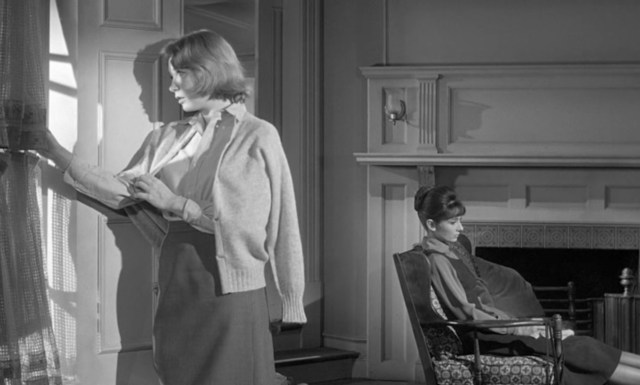
Sidebar: The cinematography in this movie is amazing.
Despite the two women ultimately being absolved, Shirley’s character still decides to end her life. It’s a dramatic twist that’s unearned. But it’s the only way a play in the 30s and a movie in the 60s could end. Audrey attends the funeral still determined not to be with the doctor. She walks away from the cemetery wearing a small black hat worthy of Shirley’s Fifth Avenue dreams. Her face contains an odd peace. Maybe she’s off to do what Shirley couldn’t. Maybe she’s going to start a new gay life somewhere. I’m projecting, but in her face I see hope, I see a future where lesbian cinema will move beyond subtext, beyond tragedy. And yet, also. I see someone who got to kiss Shirley MacLaine on the cheek, nuzzled briefly in her perfect hair.
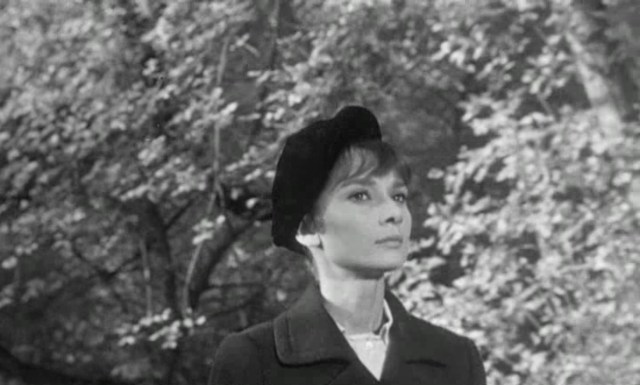
“I wonder if I should move to New York or San Francisco.”



This piece is so perfect. Thank you.
I still remember reading the play in dramatic lit in hs. I think the emotional overload might’ve fried my brain for a while. Anyway, it’s been a solid billion years now, so I guess I’m finally ready for the movie. 😏
Sounds like it’s worth it for pining Shirley MacLaine alone.
Wow I did not realize how much I needed this series! I can’t wait to see your other picks over the next 9 weeks Drew. 😀
Drew, this is a superb article. I have never been able to make myself watch this movie because sad. Even with your “they can be fun… if you’re horny enough” urging…I just can’t. But I ADORE your analysis!!!
This is fair!! I promise there will be a few films in this series that don’t end in death. But only a few. lol
Fantastic review. I have always maintained that Audrey Hepburn’s character was just as in love and the little girl, while a hideous liar, also sensed it way more than everybody else. But you really captured the essence of why the film is so heartbreaking: Shirley MacLaine. She is utterly brilliant. And we must give kudos to William Wyler for never giving up on wanting to film THIS version. He was the director of a 1936 movie called These Three, which was tbe first adaptation of the play. But he was forced to make it heterosexual. And Miriam Hopkins, who plays the aunt in this one played one of the women accused in the first one. But Wyler was never happy about it and finally got this chance to make the real version. The film never got any love from critics and audiences, but I think Its a masterpiece. Thank you for this review and look forward to others.
I’m 52 now, and saw this film in the 80’s sometime. I was massively suicidal for many reasons, my sexuality/lack of my own and others understanding was one of the ”lesser” reasons in ways I can’t quite articulate still, and yet this film, SOMEHOW, still left me hopeful. It’s the first lesbian film I remember seeing, and I know I ”should” have been more upset than I was.. but I don’t know, maybe feeling like I wasn’t ”the only one” was enough? And it kind of made it.. okay? for me to be suicidal..
I think that response makes a lot of sense and I’m so glad it was your experience with the film!
While I’m happy there is now a wider range of representation, I still do find a lot of connection with lesbian movies that deal with depression and suicide and self-hatred.
First of all, thank you for this! I didn’t even realize the 5th ave comments and cheek kiss! I’m saying this as someone who hunted down the actual play to read, flew to London with a half dozen of her friends to watch the play (with Keira Knightley and Emma Stone) despite her terror of flying and living in another country, and of course watching the movie about a dozen times.
The love confession is still one of the best, with few rivals, of all time.
Not just because Shirley McLaine is absolutely, ruthlessly slaying it, but because I usually fail to think of one which is so utterly devoid of expectation.
This isn’t a „I have the slightest hope of you loving me back, please do“ request.
It’s just out there, it’s brutal in its rawness, but there’s no ask in it at all.
It’s a love confession in its purest form.
It also, of course channels all of Shirley‘s character‘s self hate, but God, haven’t I felt that,too, at times.
Still, there’s hope, somehow.
Of course this is 1961 and the movie would never have been allowed to have any other ending than it does (in the US).
But.
Audrey isn’t appalled or disgusted. She’s gentle.
There’s a quiet, silent, „not all is lost“ somewhere in the way she reaches for Martha, the way her voice softens.
There’s a whole lot of hope in this movie actually,when you‘re reading between the lines.When it‘s still black and white time and no rainbows anywhere in sight.
I mean, in 95% of TV shows and movie tropes in recent, color tv times, Martha would have been absolutely vilified, the serial killer, the stalker (looking at you, there, OC) the dum dum dum, psycho best friend who’s been lusting after the protagonist the whole time.
But here, she is just hurting, so bad. And absolutely no one can fault her, unlike she herself does, for falling for Audrey Hepburn in this. She just so epheremal.
There’s talk of magic lands of people living their lives, who are actually what they‘ve been accused of, there’s the frigging doctor, the perfect beard, sitting there the whole time and unlike 99% of future TV not used for a dose of compulsory heterosexuality, but instead chucked to the side eventually.
There are, after all, these two women, living their lives, no building a life together for years, which is being destroyed by a rumor meant to hurt and demean but somehow, Audrey walks out of this, head held high, full of dignity,
Even in the final scene,she doesn’t rush to the doctor‘s arms, or refute being gay, instead, she walks out of that town, and whether she reciprocated it or not, she walks out of there, spiritual middle finger raised to everyone, because she was, after all loved by a woman who was better than any of them.
Thank you for this comment. I agree, Audrey’s response is really moving, and why the ending feels, to me, bittersweet, rather than simply tragic.
Thank you for the love you have for this film, this is very touching
Amidola….you wrote the most beautifully descriptive review of one of my most favorite movies (1961). Thank you for your incite which perfectly covers every emotion. I am 68 & I saw this film at a very young age which touched my soul & saddened me on how society destroyed a life for merely loving another human being!!!
I’m gonna love this series. Crossing my fingers for Olivia by Jacqueline Audry.
I’ve never seen it because I can’t find it anywhere!
I heard they’re doing a US release of the restoration this year, so hopefully that happens and it gets a proper streaming/video release as well.
But I’m impatient so if you know a way I can see it sooner let me know. :)
I only have a very old VHS edition that was later converted to DVD after a very extensive, and expensive, quality enhancement.
But I can make it a little more easier, how about Yasuzô Masumura’s Manji?
I love your commitment! Well, if that rerelease does happen I’ll definitely do an encore post and cover it.
And I love Manji. Check back in two weeks. ;)
I saw this movie when I was very, very young and it left all sorts of weird impressions. I was in boarding school, accusations of lesbianism were rampant, I being one of the targets, and LOL it was true in my case too.
I couldn’t understand why one of them committed suicide (in my memory it was Audrey though, that’s funny), but I did see how the suicide seemed to satisfy the people around me, most notably my aunt, my mother. That was pretty icky to see.
It’s great to revisit this film in such good company ! I’m looking forward to the rest of the series.
Thanks for this excellent write up! I am going to track it down and watch it here one of these days.
I’d like to see you cover ”Lianna”, which for an 80s film, written by a man, wasn’t… too awful! I mean, there wasn’t a ”happy” ending, but I don’t remember anyone dying, and for 17-year-old me, it made sense of a lot of things I was STILL hoping would go away. Then the next year Desert Hearts came out and i went to see it 8 times, largely to stare at Patricia Charbonneau.. and that was game over, really.
The 80s were definitely an exciting time for lesbian movies. Those two, of course, and Personal Best as well.
I might explore all of those at some point…
I have never watched this movie, ill have to see it this week it looks amazing
As someone who has seen the documentary The Celluloid Closet at least 5 times, I am so excited for this series!
As with other classic films I watched before I came out, I felt drawn to this story (and both Audrey and Shirley obvs) in a way that I couldn’t yet name or describe. Both this and the similarly themed Prime of Miss Jean Brodie (shout out to young hot Maggie Smith) deal painfully with the consequences of independent female sexuality. The fact that of the two, the straight woman gets to live was not lost on me either.
I LOVE THIS SERIES.
TCM did a “Celluloid Closet” series in June yeeeaaaars ago, and I remember being floored at how much cinema there was throughout the years that had queer gals. I love old films, and am so happy you’re covering them!
Please do “The Haunting of Hill House” next! I need a rewatch of the ’60’s version, and I want someone else’s thoughts on Eleanor/Theo!
I think my formative queer movies were more guy ones, this is going to be fascinating (if a little bleak if everyone dies).
Is it just me or does the feature image look just like Michelle Williams?
Considering I have a big crush on Michelle Williams I feel called out and also yeah they absolutely look similar. lol
And she’s the star of the best part of the aforementioned If These Walls Could Talk 2!
I was taking a look at my collection and Jebus I have a bunch of dead lesbians and bisexuals in the 50’s, 60’s, 70’s and 80’s, and only gets a bit better in the 90’s.
“The Killing of Sister George!” Classic alcoholic battle axe butch! I. CANNOT. WAIT!
I am so excited for this series.
I finally watched this last night, long after forgetting that this series was how it ended up on my list, so I was immediately like, “Oh lol, these guys are such lesbians,” and then fifteen minutes later realized that this was in fact kind of the plot.
What I’m TRULY obsessed with though is the part of the film where The Man Whose Name I Forget (Audrey’s Fiance) was like, “yes, we will run away from here and obviously we will take your girlfriend with us” ??? He keeps being like “the three of us will start over together” and I just… I hadn’t been at all impressed with him (whatever his name is), but the idea of them going off to be a beautiful bisexual cottagecore throuple spoke to me. I would like a remake with this ending.